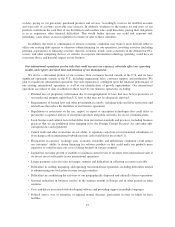Symantec 2012 Annual Report Download - page 99
Download and view the complete annual report
Please find page 99 of the 2012 Symantec annual report below. You can navigate through the pages in the report by either clicking on the pages listed below, or by using the keyword search tool below to find specific information within the annual report.A significant portion of our transactions outside of the U.S. are denominated in foreign currencies.
Accordingly, our revenues and expenses will continue to be subject to fluctuations in foreign currency rates. We
expect to be affected by fluctuations in foreign currency rates in the future, especially if international sales
continue to grow as a percentage of our total sales or our operations outside the United States continue to
increase.
The level of corporate tax from sales to our non-U.S. customers is generally less than the level of tax from
sales to our U.S. customers. This benefit is contingent upon existing tax regulations in the U.S. and in the
countries in which our international operations are located. Future changes in domestic or international tax
regulations could adversely affect our ability to continue to realize these tax benefits.
Our products are complex and operate in a wide variety of computer configurations, which could result in
errors or product failures.
Because we offer very complex products, undetected errors, failures, or bugs may occur, especially when
products are first introduced or when new versions are released. Our products are often installed and used in
large-scale computing environments with different operating systems, system management software, and
equipment and networking configurations, which may cause errors or failures in our products or may expose
undetected errors, failures, or bugs in our products. Our customers’ computing environments are often
characterized by a wide variety of standard and non-standard configurations that make pre-release testing for
programming or compatibility errors very difficult and time-consuming. In addition, despite testing by us and
others, errors, failures, or bugs may not be found in new products or releases until after commencement of
commercial shipments. In the past, we have discovered software errors, failures, and bugs in certain of our
product offerings after their introduction and, in some cases, have experienced delayed or lost revenues as a
result of these errors.
Errors, failures, or bugs in products released by us could result in negative publicity, damage to our brand,
product returns, loss of or delay in market acceptance of our products, loss of competitive position, or claims by
customers or others. Many of our end-user customers use our products in applications that are critical to their
businesses and may have a greater sensitivity to defects in our products than to defects in other, less critical,
software products. In addition, if an actual or perceived breach of information integrity or availability occurs in
one of our end-user customer’s systems, regardless of whether the breach is attributable to our products, the
market perception of the effectiveness of our products could be harmed. Alleviating any of these problems could
require significant expenditures of our capital and other resources and could cause interruptions, delays, or
cessation of our product licensing, which could cause us to lose existing or potential customers and could
adversely affect our operating results.
If we do not protect our proprietary information and prevent third parties from making unauthorized use of
our products and technology, our financial results could be harmed.
Most of our software and underlying technology is proprietary. We seek to protect our proprietary rights
through a combination of confidentiality agreements and procedures and through copyright, patent, trademark,
and trade secret laws. However, all of these measures afford only limited protection and may be challenged,
invalidated, or circumvented by third parties. Third parties may copy all or portions of our products or otherwise
obtain, use, distribute, and sell our proprietary information without authorization.
Third parties may also develop similar or superior technology independently by designing around our
patents. Our shrink-wrap license agreements are not signed by licensees and therefore may be unenforceable
under the laws of some jurisdictions. Furthermore, the laws of some foreign countries do not offer the same level
of protection of our proprietary rights as the laws of the U.S., and we may be subject to unauthorized use of our
products in those countries. The unauthorized copying or use of our products or proprietary information could
result in reduced sales of our products. Any legal action to protect proprietary information that we may bring or
20
























